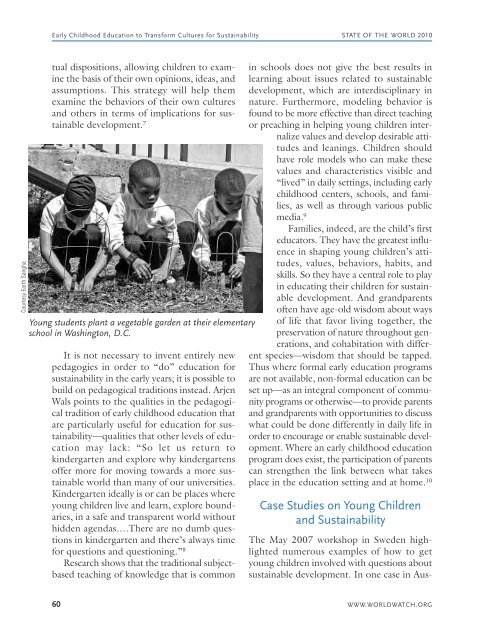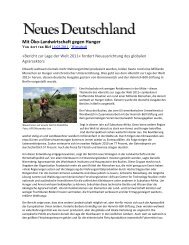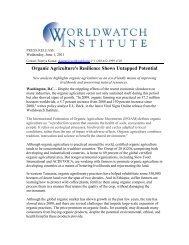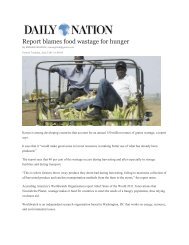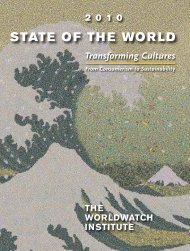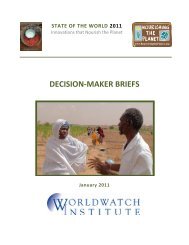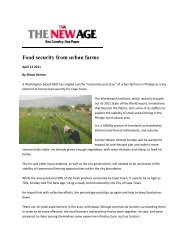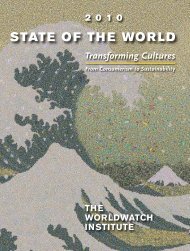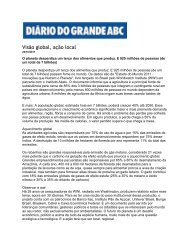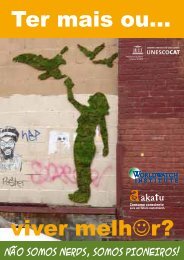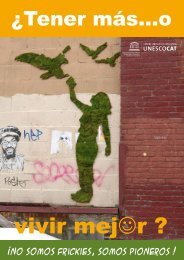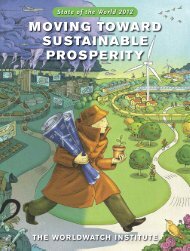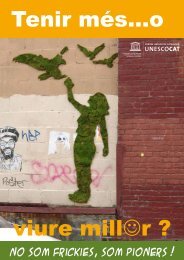Early Childhood Education to Transform Cultures for Sustainability
Early Childhood Education to Transform Cultures for Sustainability
Early Childhood Education to Transform Cultures for Sustainability
You also want an ePaper? Increase the reach of your titles
YUMPU automatically turns print PDFs into web optimized ePapers that Google loves.
Courtesy Earth Sangha<br />
<strong>Early</strong> <strong>Childhood</strong> <strong>Education</strong> <strong>to</strong> <strong>Trans<strong>for</strong>m</strong> <strong>Cultures</strong> <strong>for</strong> <strong>Sustainability</strong> STATE OF THE WORLD 2010<br />
tual dispositions, allowing children <strong>to</strong> examine<br />
the basis of their own opinions, ideas, and<br />
assumptions. This strategy will help them<br />
examine the behaviors of their own cultures<br />
and others in terms of implications <strong>for</strong> sustainable<br />
development. 7<br />
Young students plant a vegetable garden at their elementary<br />
school in Washing<strong>to</strong>n, D.C.<br />
It is not necessary <strong>to</strong> invent entirely new<br />
pedagogies in order <strong>to</strong> “do” education <strong>for</strong><br />
sustainability in the early years; it is possible <strong>to</strong><br />
build on pedagogical traditions instead. Arjen<br />
Wals points <strong>to</strong> the qualities in the pedagogical<br />
tradition of early childhood education that<br />
are particularly useful <strong>for</strong> education <strong>for</strong> sustainability—qualities<br />
that other levels of education<br />
may lack: “So let us return <strong>to</strong><br />
kindergarten and explore why kindergartens<br />
offer more <strong>for</strong> moving <strong>to</strong>wards a more sustainable<br />
world than many of our universities.<br />
Kindergarten ideally is or can be places where<br />
young children live and learn, explore boundaries,<br />
in a safe and transparent world without<br />
hidden agendas….There are no dumb questions<br />
in kindergarten and there’s always time<br />
<strong>for</strong> questions and questioning.” 8<br />
Research shows that the traditional subjectbased<br />
teaching of knowledge that is common<br />
in schools does not give the best results in<br />
learning about issues related <strong>to</strong> sustainable<br />
development, which are interdisciplinary in<br />
nature. Furthermore, modeling behavior is<br />
found <strong>to</strong> be more effective than direct teaching<br />
or preaching in helping young children internalize<br />
values and develop desirable attitudes<br />
and leanings. Children should<br />
have role models who can make these<br />
values and characteristics visible and<br />
“lived” in daily settings, including early<br />
childhood centers, schools, and families,<br />
as well as through various public<br />
media. 9<br />
Families, indeed, are the child’s first<br />
educa<strong>to</strong>rs. They have the greatest influence<br />
in shaping young children’s attitudes,<br />
values, behaviors, habits, and<br />
skills. So they have a central role <strong>to</strong> play<br />
in educating their children <strong>for</strong> sustainable<br />
development. And grandparents<br />
often have age-old wisdom about ways<br />
of life that favor living <strong>to</strong>gether, the<br />
preservation of nature throughout generations,<br />
and cohabitation with different<br />
species—wisdom that should be tapped.<br />
Thus where <strong>for</strong>mal early education programs<br />
are not available, non-<strong>for</strong>mal education can be<br />
set up—as an integral component of community<br />
programs or otherwise—<strong>to</strong> provide parents<br />
and grandparents with opportunities <strong>to</strong> discuss<br />
what could be done differently in daily life in<br />
order <strong>to</strong> encourage or enable sustainable development.<br />
Where an early childhood education<br />
program does exist, the participation of parents<br />
can strengthen the link between what takes<br />
place in the education setting and at home. 10<br />
Case Studies on Young Children<br />
and <strong>Sustainability</strong><br />
The May 2007 workshop in Sweden highlighted<br />
numerous examples of how <strong>to</strong> get<br />
young children involved with questions about<br />
sustainable development. In one case in Aus-<br />
60 WWW.WORLDWATCH.ORG


